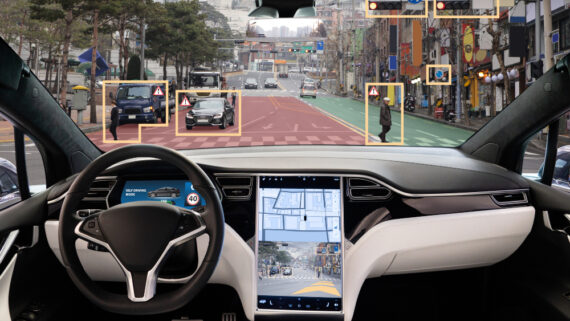Autonomous Vehicle Technology: Investing in the Future of Transport
Autonomous vehicle technology is rapidly advancing, with more solutions coming from companies that aren’t named “Tesla.” Implementation is also expanding. Many companies are testing autonomous technology on passenger cars and even semi-trucks.
For example, the following autonomous vehicle milestones have recently been reached:
- TuSimple’s semi-truck just went 80 miles with no human on board or intervening
- GM’s Mary Barra takes a fully autonomous Chevy Bolt on a ride
Of course, these are just some of the advancements in autonomous vehicle technology in recent months. Companies are making great strides that will shape the future of autonomous vehicles and how people drive.

Which Autonomous Vehicle Company Should You Invest In?
Autonomous vehicles have many moving parts. You can invest in Tesla, but there are many companies that license software and technology for their vehicles. A few of the leading autonomous vehicle companies to invest in are:
- Tesla: A company that needs no introduction. The company brought EVs and the potential for autonomous vehicles into the spotlight. However, there have been a lot of promises of fully autonomous vehicles that have yet to come to fruition.
- Ford: A prime example of a company that uses third-party AI to bring self-driving vehicles to the forefront. The company invested in and formed a joint venture with AI Argo. AI Argo has vehicles that are already being tested in Detroit, Austin and other cities.
- General Motors: Another giant automaker, GM’s Cruise division is their autonomous vehicle division and is said to have technology that surpasses Ford. The Cruise division of GM is testing fully self-driving vehicles.
- Waymo: If you want to invest in Waymo, you’ll need to invest in Alphabet, Inc. The project is a former Google project that has already surpassed over 20 million miles on the road. Backed with the big data of Google, Waymo has the potential to rapidly advance in the near future.
- Intel: The chipmaker made a significant investment in 2017 when they purchased Mobileye for $15 billion. Mobileye is a self-driving technology company operating out of Israel. The company offers “vision technology” that is responsible for making sense of a vehicle’s surroundings in real-time. Intel may not make their own vehicles, but this tech is already being used by BMW, Volkswagen Group and others. Tesla did use the company’s technology for a short time. The company may IPO in 2022.
Additionally, there are other companies that are necessary to help carmakers bring their autonomous vehicle technology to the world. For example, Texas Instruments produces chips and semiconductors that will be necessary for these vehicles.
ChargePoint Holdings will be a company to watch for the foreseeable future and as EVs become more popular. The goal of the company is to offer seamless and widespread charging solutions.
Autonomous Vehicle Implementation Predictions
No one knows what the future holds for autonomous vehicles, but we can make predictions of what we may see in the next few years and through 2030.
- Software will remain the most crucial part of the industry and will benefit the most through 2030. Automakers may even begin leasing out their own software to push the market further and recuperate some R&D costs.
- Level 3 and 4 automation will become even more popular. Tesla operates at Level 2, and we’re seeing competitors, such as Waymo, already operating at Level 4 autonomy. Level 5, or full autonomy, is likely to occur closer to 2030.
- 5G will remain crucial for the advancement and deployment of autonomous fleets. Analytics and AI will rely heavily on the use of 5G. The sooner widespread adoption of 5G becomes a reality, the more likely we’ll see more vehicles reaching the Level 4 and 5 designations.
- Collaboration will be necessary if we’re to see a boom in self-driving vehicles. Automakers will need to work together to develop cutting-edge technologies, expand charging stations and help get policies passed. Frameworks that empower these companies to expand their operations within the confines of the law should be fleshed out through collaboration or all companies.
By 2030, we expect that there will be far more automation in the transportation industry, especially in supply chains and taxis.
Software for self-driving vehicles is also advancing. Many manufacturers are bringing their software in-house. However, companies such as Nvidia are also pushing the future of autonomous vehicles forward with complex, advanced chips and technology.
The future looks bright for the autonomous vehicle industry. Car manufacturers will benefit from increased sales, but there will also be a significant boost to third-party profits, such as Intel, which will also benefit directly from these sales.
We hope you enjoyed our article about autonomous vehicle technology. Feel free to contact us if you have any questions.
